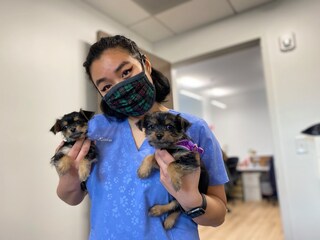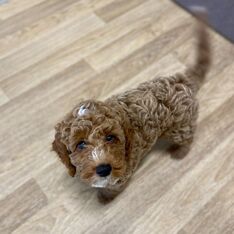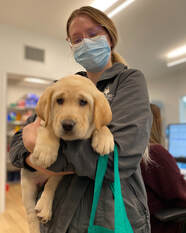|
Part 1 in a 3 part series with Proper Paw's Judy Bernard on socializing puppies during COVID-19  Adorable puppies Boba & Mochi with CAH Tech Eunice Adorable puppies Boba & Mochi with CAH Tech Eunice A happy effect of the pandemic is what we in the biz are calling pandemic puppies. With the activities that take us humans away from home on hold – commutes, long work and school days, travel for work and fun, nights out – many of us have decided that this is a great time to bring home a new four-legged friend. We have more time to train them and lots of time to enjoy them. For many families, a new pet is a bright spot, a way to make this complicated time special. As much as this is a fabulous time to bring home a new pet, the pandemic-enforced isolation presents specific challenges for owners of new puppies, but we’re here to help! Concord Animal Hospital’s Katherine Wilson spoke with Judy Bernard, owner of Proper Paws Dog Training right here in Concord, Certified Professional Dog Trainer-Knowledge Assessed, and member Association of Professional Dog Trainers to get her thoughts on how new dog owners can face the challenges the pandemic presents. The result is a three part series for new puppy owners:
A dog that is not exposed to a variety of stimuli during this critical period is at risk of developing behavior problems later on."  Bao in for his first visit with us Bao in for his first visit with us Katherine: For our new puppy owners, can you explain what is puppy socialization? Judy: First let me tell you what puppy socialization IS NOT. Puppy socialization is not having your new puppy play with every dog in the neighborhood. It’s not making your dog walk up to noisy garbage trucks or school buses that frighten them. It’s also not having every person that walks by them on the sidewalk stop and pet them! Even during a pandemic, we can socialize our dogs quite well while still maintaining appropriate social distancing. In some cases, it makes it EASIER! Socialization is exposing your new puppy to as many new and novel experiences as you can in a way that is positive and enjoyable for the puppy. Puppies go through a critical developmental period from about 3-12 weeks where they are most amenable to experiencing new things. This period is called the Primary and Secondary Socialization period. This period is tied to the development of social patterns and provides a foundation for many adult dog behaviors.1 In short, a dog that is not exposed to a variety of stimuli during this critical period is at risk of developing behavior problems later on.  CAH Tech Ali giving Swizzy a lift CAH Tech Ali giving Swizzy a lift Katherine: How should new puppy owners socialize them? Judy: It’s really important to carefully expose your 7-14 week old puppy to lots of novel stimuli. This means taking the dog for rides in the car, walks on all different substrates, climbing in out and of boxes, eating out of different dishes, seeing different animals (cats, horses, chickens), and generally experiencing every possible place or thing you might expect your dog to go and see when they are grown. Keep your trips short and enjoyable! Make sure you have plenty of yummy treats with you, if the puppy seems worried – feed them. While puppy play dates with other puppies of similar age, size and temperament are a PART of socialization, socialization doesn’t begin and end with puppy playdates. Katherine: What else should new puppy owners know about socializing their dog? Judy: Socialization also does not begin at 7 weeks or end at 12 weeks. Breeders can do a lot to help a dog develop resilience in their adulthood with early handling, brief interludes of separation from the pack, taking the puppies on rides in the car, introducing them to crates, etc.2 Older puppies that are rescued can also benefit from CAREFUL exposure to novel stimuli. Older puppies tend to be more fearful but this doesn’t mean we should stop socializing. It does mean we need to be careful to make sure the experiences your dog is getting are positive. Make sure you have an ample supply of yummy treats on hand and use them to help your dog associate the new things they are seeing with good treats. Never force your dog to approach something it fears, no matter how silly it may seem. Instead, let your dog choose the distance they want to keep and help them associate that very scary garbage can, vending machine or snowman with something good by feeding them every time they see that scary thing!
Check back in February for part 2 in our Training Tips for Pandemic Puppy Owners: Helping your dog with vet visits during a pandemic.
Comments are closed.
|
|
OFFICE HOURS:
Monday-Friday: 8:00 am to 6:00 pm Saturday: 8:00 am to 12:00 pm |
CONTACT INFORMATION:
Concord Animal Hospital 245 Baker Avenue Concord, MA 01742 Phone: (978) 369-3503 Fax: (978) 371-9748 [email protected] |
JOIN OUR PACK!
Sign up for our monthly newsletter, the Paw Press for hospital news, pet care tips and cute pet photos! |
Copyright © 2022

